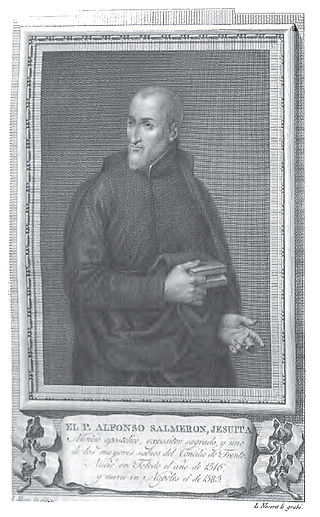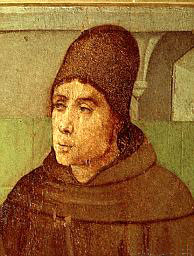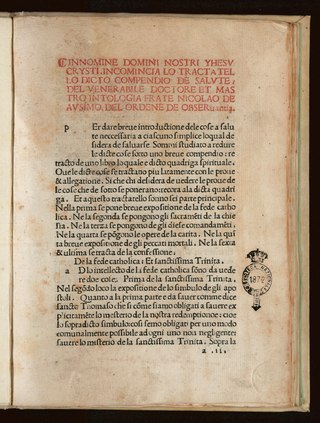This article includes a list of references, related reading, or external links, but its sources remain unclear because it lacks inline citations .(April 2014) |

Andreas de Vega (died c. 1560) was a Spanish theologian and Franciscan Observantine.
This article includes a list of references, related reading, or external links, but its sources remain unclear because it lacks inline citations .(April 2014) |

Andreas de Vega (died c. 1560) was a Spanish theologian and Franciscan Observantine.
Vega was born at Segovia in Old Castile, Spain. He studied at the University of Salamanca, and was a professor there when he became an Observantine of the Franciscan Order. He continued his work as a teacher in the monastery of the Observantines where Alphonso de Castro also taught. He died at Salamanca.
Vega was a moderate Scotist who at the same time held to St. Bonaventure. The Emperor Charles V sent Vega as theologian together with other scholars to the Council of Trent. At Trent he came into connection with Cardinal Petrus Pacheco, Bishop of Jaen (consequently called "Giennensis"), who was a patron of the Franciscan Order. Vega was conspicuous in the preliminary discussions of the canon of the Scriptures and on the Vulgate , which were treated in the Decree promulgated in the fourth session of the council, 8 April 1546. He also took a prominent part in the preliminary discussions on the dogma of justification, and drew attention to himself at the same time by his debates with Dominicus de Soto, the Dominican who defended the dogmas of Thomism. The Decree was promulgated in the sixth session on 13 January 1547.
Previous to the council Vega had written to defend the Catholic doctrine of justification against the Protestants, "De justificatione, gratia fide, operibus et meritis quaestiones quindecim" (Venice, 1546). The dedication to Cardinal Pacheco is dated Trent, 1 January 1546. After the promulgation of the Decree he wrote in its defence at Trent and Venice, "Tridentini decreti de justificatione exposition et defensio lib. XV distincta" (Venice, 1548). In the last two books he attacks John Calvin's "Acta synodi tridentinae cum antidoto" (Geneva, 1547). This was Vega's major work. Peter Canisius had it reprinted at Cologne (1572) in one volume with Vega's previous work, "De justificatione". Reprints were issued at Cologne (1585) and at Aschaffenburg (1621).
A posthumous work by Vega was also published, his "Commentaria in Psalmos" (Alaclà de Henares, 1599).

The Council of Trent, held between 1545 and 1563 in Trent, now in northern Italy, was the 19th ecumenical council of the Catholic Church. Prompted by the Protestant Reformation at the time, it has been described as the embodiment of the Counter-Reformation.

Alfonso Nicolás (Alphonsus) Salmerón, SJ was a Spanish biblical scholar, a Catholic priest, and one of the first Jesuits.

Luke Wadding, O.F.M., was an Irish Franciscan friar and historian.

Scotism is the philosophical school and theological system named after John Duns Scotus, a 13th-century Scottish philosopher-theologian. The word comes from the name of its originator, whose Opus Oxoniense was one of the most important documents in medieval philosophy and Roman Catholic theology, defining what would later be declared the dogma of the Immaculate Conception by Pope Pius IX in his constitution Ineffabilis Deus on 8 December 1854.

Diego Laynez, S.J., born in 1512 and died on 19 January 1565 (Rome), was a Spanish Jesuit priest and theologian, a New Christian, and the second Superior General of the Society of Jesus after the founder Ignatius of Loyola.
Giovanni Buralli, known as John of Parma, was an Italian Franciscan friar, who served as one of the first Ministers General of the Order of Friars Minor (1247–1257). He was also a noted theologian of the period.
Peter "Scotellus" of Aquila was an Italian Friar Minor, theologian and bishop.
Bernard of Besse was a French Friar Minor and chronicler.

Matthew of Aquasparta was an Italian Friar Minor and scholastic philosopher. He was elected Minister General of the Order.

John Colgan, OFM, was an Irish Franciscan friar noted as a hagiographer and historian.

Cornelio Musso (1511–1574) was an Italian Friar Minor Conventual, Bishop of Bitonto (1544–1574), Bishop of Bertinoro (1541–1544), and prominent at the Council of Trent. He was, perhaps, the most renowned orator of his day, styled the "Italian Demosthenes". Returning to ancient patristic models, he raised the homily to a high form of perfection.
Jean de La Haye was a French Franciscan preacher and Biblical scholar.
Antony Hickey was an Irish Franciscan theologian.

Peter Nigri, known also as Peter George Niger, was a Dominican theologian, preacher and controversialist.
John Punch (1603–1661) was an Irish Franciscan scholastic philosopher and theologian.

Francesco Panigarola was an Italian Franciscan preacher and controversialist, and Bishop of Asti.
Lancelotto Politi was an Italian Dominican canon lawyer, theologian and bishop.

Nicholas of Osimo (Auximanus) was an Italian Franciscan preacher and author.
Catholic dogmatic theology can be defined as "a special branch of theology, the object of which is to present a scientific and connected view of the accepted doctrines of the Christian faith."
Jean Benedicti was a French Franciscan theologian of the sixteenth century.
![]() This article incorporates text from a publication now in the public domain : Herbermann, Charles, ed. (1913). "Andreas de Vega". Catholic Encyclopedia . New York: Robert Appleton Company. The entry cites:
This article incorporates text from a publication now in the public domain : Herbermann, Charles, ed. (1913). "Andreas de Vega". Catholic Encyclopedia . New York: Robert Appleton Company. The entry cites: